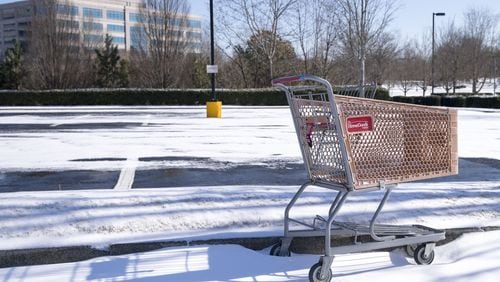The storm that closed government offices and schools throughout metro Atlanta on Wednesday also temporarily shuttered many businesses.
So, what's the expected impact on the region's roughly $365 billion economy? Zilch, say economists. That's even if the icy conditions stick around for several days.
People who postponed a purchase will just make it later. And most companies that closed because they expected to do little business or wanted to keep employees off the roads will just do more later to make up for snow days.
Extra efforts can usually make up for the brief dips in productivity.
“We sometimes do find the impact of natural events in the data, but it is always temporary,” said Rajeev Dhawan, director of the Economic Forecasting Center at Georgia State University. “Only if it goes on a week or more would it show up in the longer-term numbers.”
No more snow is on the horizon for Atlanta, according to meteorologists at Channel 2 Action News. Temperatures are expected to climb steadily the rest of the week, with highs in the 40s Thursday and the 50s Friday and Saturday.
Some companies, like builders, generally plan for some bad weather days. It doesn't matter to their schedule whether the delay is for a normal rain or an unexpected snow.
While hotels lose out on customers who are prevented from coming to town, they make up for it with the money from current guests who cannot leave.
That’s not to say that all businesses do fine: Some take a nasty hit.
The most vulnerable to short-term closings are services that won’t be able to make up for lost revenue by selling extra in the next few days. Restaurants and their employees, especially, are economic losers when harsh weather keeps customers and workers away, Dhawan said.
“If you miss a meal today, you won’t make that up by buying two meals tomorrow,” he said.
He estimated that about 4.5 percent of the workforce – 130,000 of the region’s 2.9 million workers — are in sectors that are susceptible to short-term losses.
But many workers feel pressure to head out to work, even if they are not taking an immediate financial hit.
Phil Costabile, 31, didn’t have a long morning commute from one part of Buckhead to another Wednesday, and said there didn’t seem to be any ice on the roads just yet. But he said he still saw a few cars “spinning out for a while” during his journey.
“I’m originally from Pennsylvania,” Costabile said. “I think my family would’ve been disappointed in me if I didn’t go to the office over an inch-and-a-half of snow.”
He said he planned to put in a full day of work.
“Hopefully, it doesn’t freeze over,” he said.
Staff writer Tyler Estep contributed to this story.







